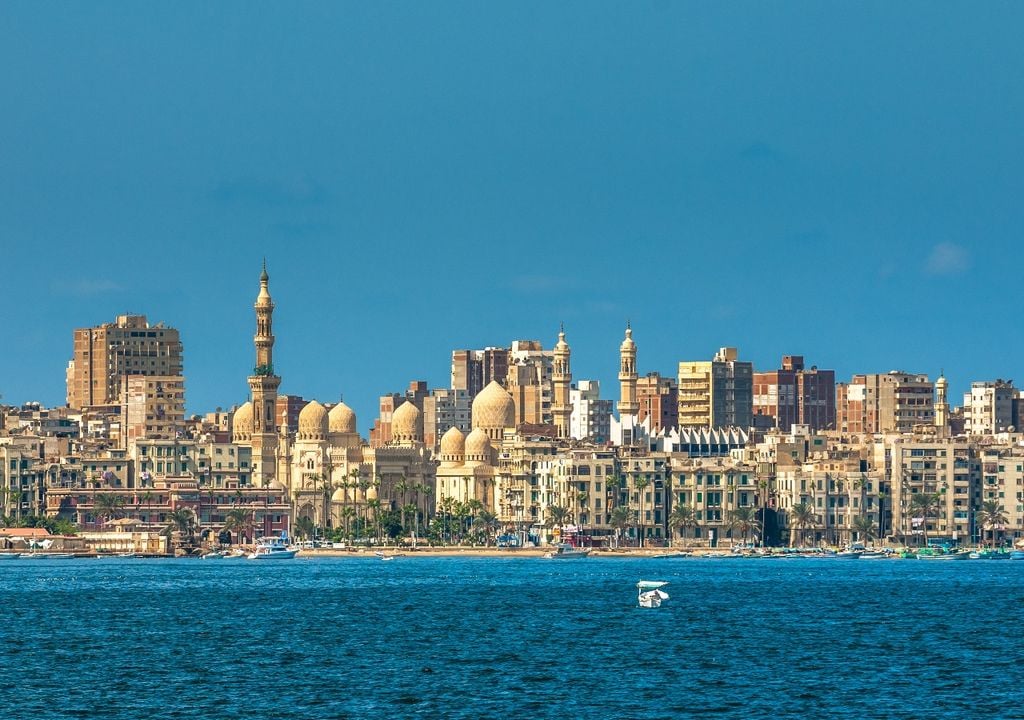A study warns that an iconic city founded by Alexander the Great is losing several meters of coastline each year, and that saltwater intrusion threatens its millennia-old history.
Rising sea levels pose an increasingly urgent threat to coastal cities worldwide. A particular case that has caught the attention of scientists is that of the « Bride of the Mediterranean, » the city founded by Alexander the Great, which succumbs each year to the advancing saltwater.
Here is Alexandria, one of the oldest and most iconic cities in the world. According to a study from the University of Southern California (USC), coastal erosion is devastating the urban and residential infrastructure of the Egyptian city: between 2001 and 2021, building collapses, once rare, increased from one per year to over 40 annually.
« Alexandria, a historic and densely populated port city in Egypt, has experienced more than 280 building collapses along its coastline in the past two decades, » the study states.
Scientists created a digital map of collapsed buildings in six districts of the city using Geographic Information System (GIS) technology and combined satellite images with historical maps to analyze coastal movements over the past decades. Additionally, they conducted isotopic chemical analyses on soil samples to measure the effects of saltwater intrusion on building foundations.
They found that in certain areas, the coastline is retreating by 24 to 36 meters per year, facilitating the infiltration of seawater into the underground. This phenomenon weakens soil stability and accelerates the deterioration of construction materials.
Between 2014 and 2020, 287 residential buildings collapsed in Alexandria due to erosion, causing 86 deaths and affecting 782 families. This figure represents 31% of the landslides that occurred in Egypt during this period.
« Buildings collapse from beneath because the saltwater intrusion erodes the foundations and weakens the soil, » explains Ibrahim Saleh, co-author of the study and specialist in soil radiation.
This phenomenon not only leads to a high material cost but also the loss of historical and cultural heritage. « We are witnessing the gradual disappearance of historic coastal cities, and Alexandria has sounded the alarm, » said Essam Heggy, co-author of the study.
Causes of the Phenomenon
« Rising sea levels and intense storms are destroying in a few decades what took millennia of human ingenuity to create, » says architect Sara Fouad, lead author of the study.
The impact of this erosion is not unique to Alexandria but affects other coastal cities, such as those in California. NASA and NOAA research shows that parts of the Californian coast are also experiencing subsidence, increasing the risk of flooding and saltwater intrusion, and weakening infrastructure and water supplies.
The study proposes nature-based solutions to mitigate these effects, such as creating sand dunes and vegetative barriers to block saltwater intrusion. « This sustainable approach is cost-effective and can be applied in many densely urbanized coastal regions, » the authors stated.
Alexandria has been a cultural, scientific, and commercial hub since its founding in 331 BC by Alexander the Great. For centuries, it housed the famous Library of Alexandria, one of the largest centers of knowledge in the ancient world.
Today, the city, with a population of over 5 million, remains a living testament to history and human resilience. Along its coastline, the city retains a rich heritage, including iconic structures such as the Lighthouse of Alexandria, one of the Seven Wonders of the Ancient World.
The contrast between its historical legacy and the climate threat it faces today underscores the urgency of finding solutions to protect the heritage of coastal cities in the face of the climate crisis.
Source: tameteo



